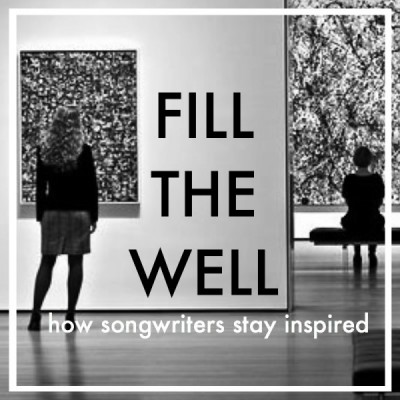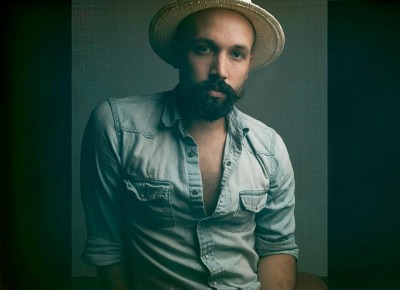in this series, i ask other songwriters about their quest for inspiration and how they tackle the day-to-day tasks of writing quality, engaging songs. behind every good song is a hard-worker. i want to know how songwriters work and how they fill their well so it never goes dry.
Nashville-based Aron Wright is many things. An acoustic-folk singer-songwriter is just one. His creativity bleeds into many forms of art and entrepreneurship, and whatever he seems to touch just turns to gold. He has mastered multi-tasking: growing a photography software business, writing beautiful, haunting songs, investing in other artists, managing construction projects with his wonderful wife artist Kelly Bonadies. Aron’s song “And still, the darkness comes” was recently featured on Grey’s Anatomy — watch and listen to the video after his interview. Be sure to pull out your notebook for this one… lots of inspiring bits!
1. What is your typical work day?
I wake up whenever my wife Kelly makes me, drink lots of coffee and head to the studio loft she has built for me. I’ll usually listen to whatever recording I was working on the night before for a few hours, adding and experimenting with different instruments and parts. Sometimes I remember to eat lunch then I work for my photography software business: answering emails and working out technical issues, with occasional musical breaks. We have about 7000 sq ft. in an old flour mill in which Kelly designed. She oversaw the construction of many art studios that we filled with our artist, photographer, filmmaker, designer, musician friends. All that to say, people come into our space a lot during the day and we talk about what’s going on, art projects and the business of it all. We constantly advise each other on whatever we’re working on and generally take care of each other. I probably work with music 6-8 hours a day and another 6-8 on everything else, but it’s all fun because I’m around my wife and my friends all the time. It doesn’t feel like work at all.
2. What tools do you use to keep you organized and productive?
Nothing seems to keep me organized, but I am naturally productive, even if it seems I’m doing nothing. I’m usually working on something in my head, whether it’s a song or a video for a song, or some business-y idea. I almost always have a Pilot G2 bold black ink pen and one of the small notebooks Kelly made for me in my pocket. I also have probably six or more of those little black Mead notebooks in my studio that I scribble ideas in (and mostly never look at again) and I will also use those for to-do lists. I use my phone, a Galaxy Note 2, to write down and record ideas. When I travel I always take at least a ukulele and a Zoom H2 recorder to capture melodies as they come. I record/mix/master/play all the instruments myself on Logic Pro, which I switched to from Pro Tools about a year ago. My lucky instrument is probably my cheap uke I carry in my car, but I love every instrument I own.
3. Do you have any habits, exercises or activities that jumpstart your creativity?
I have worked really hard to minimize and automate mundane crap that all adults must do and I’ve also always tried to figure out how to make money with the least amount of effort so I can simply have the mental time to be creative. I don’t have a problem being creative or creating things or ideas- the bigger issue throughout my life has always been trying to not be a sucky student or husband or whatever and still do what I want to the way I want to do it. I can’t remember a time in my life, until the last few years, when I didn’t feel bogged down by the work I had to do to be good. Even as a kid, school seemed bothersome because they spend so much time making you be quiet or getting you to stand in line, or teaching you something you have no interest in. I’m pretty well backed up on ideas I want to pursue, music and otherwise. My habit is purposefully getting all the other stuff out of my way.
4. Are there any specific books, films, lectures, etc. that have impacted your creative process?
Early on I was really inspired by “the Art Spirit” by Robert Henri and I love the way it’s written in short bits of wisdom. “Writing better lyrics” by Pat Pattison helped the way I think about and analyze words in my songs.
5. Where do you get your best work done?
In my studio mostly, but many ideas for songs I’ve had came to me while on vacation or out of town, which goes back to what I was saying earlier, because when I’m out of my element I’m not so much worrying about the normal things I have to take care of day to day.
6. How do you combat writer’s block?
I don’t get writer’s block so much anymore because I don’t care if I’m writing or not and I know how to work my brain. I say “what if____” a lot. Also, I realize that most problems are solved while walking the dog or driving, not when you’re actively trying to solve them. There’s something about putting your brain on autopilot that frees it up to put the pieces together. I’ve seen a lot of artists give up on their art because they weren’t being productive for a month or so, which is ridiculous. We all need time to experience life before we can try to create something emotive, time to just soak it up. In other words, it shouldn’t be considered a “block” but an essential part of having something worth saying.
If someone is “blocked” it’s because they have some irrational fear of failure or embarrassment in them–which we all have to some extent. We’re saying “I’m afraid of what might come out and what others will think of it.” I’m no scientist, but it’s probably some misplaced-prehistoric-evolutionary-reptile-brain remnant that is supposed to protect us from getting tusked by woolly mammoths. Today, that part of your brain just keeps you from writing words and makes people say “Oh, I’m not a creative type.”- it’s an overactive inhibitor, an ugly curmudgeon constantly telling us we suck and we can’t do it. People that do amazing things have probably trained themselves to resist that voice or have developed enough self-confidence to not care about what others think of them.
7. Who is your songwriting hero?
That’s really tough. I’m not sure I’d be a songwriter if I hadn’t heard Living with Ghosts by Patty Griffin in 1997, so her I guess? My favorites are generally songwriters that can really sing the song too, in a way that makes otherwise boring written words come to life- more so than caring about technically good writers. This one girl Alva Leigh can really bend a note. Seriously, the way you sustain notes and your vibrato have influenced the way I sing.
8. Do you have any advice to offer a new songwriter?
Get a real job.
Just kidding, but don’t be desperate just to be writing songs, no one likes being around desperation- especially when it’s unnecessary. Don’t get on food stamps and unemployment so you can write more, that’s just lame. Make money doing something else so your songs can be written out of love until you get things going. Even then I wouldn’t want to depend on music for my livelihood because I think it would affect your work to some extent.
Move to Nashville so we can hang out, or some other city where songwriters are, or at least surround yourself with interesting, creative people. If you hangs out with duds, your songs will surely suffer. Read a lot. Finish things. Play and practice everyday. Create good habits and have an emotionally safe place to do your work. Know it will take most people 10 years to make something happen so don’t get discouraged. Don’t be friends with people because you think you can get something out of them. Be friends with good- hearted people, that’s much more important than “making it” because “making it” doesn’t really mean anything at all if you end up being a big shot with a bunch of shallow acquaintances.


